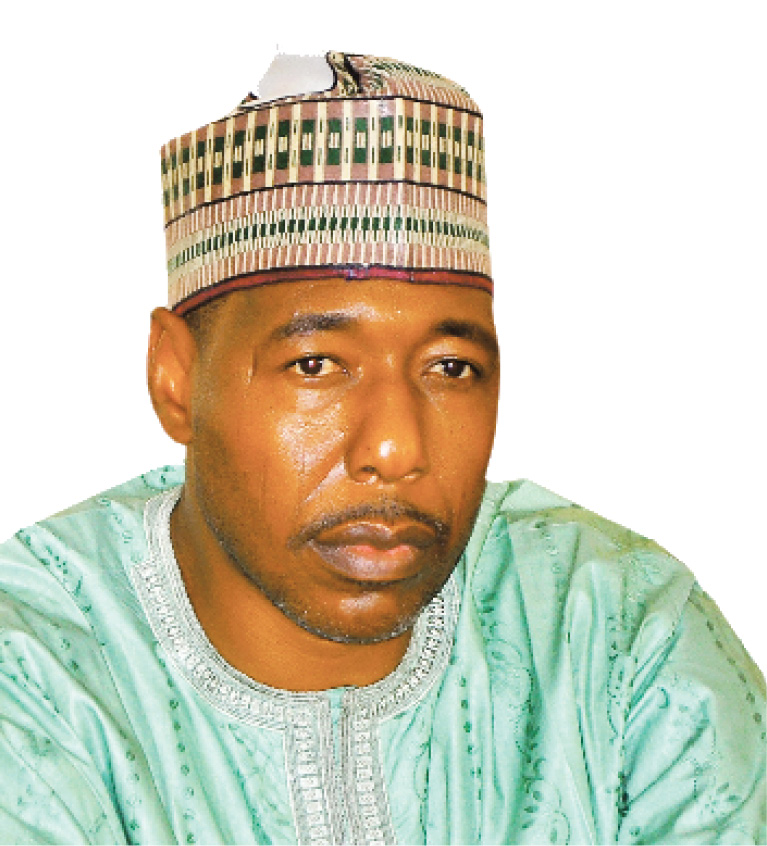Governor Babagana Umara Zulum of Borno State.
 Comrade Owei Lakemfa.
Comrade Owei Lakemfa.
By Owei Lakemfa.
BABAGANA Umara Zulum, soil scientist and professor of agriculture and environmental engineering, has a problem as the Governor of Borno State. As the chief security officer of the state, he takes on face value the security reports he gets. So when the security chiefs informed him that the town of Baga had been liberated from the Boko Haram terrorists, the army was in full control and that the residents had returned to the town, he thought it best to provide the returnees relief, more so as Sallah was approaching.
On July 29, he mobilised materials and in an armed convoy, headed for Baga. A short distance from the town, his convoy, which included soldiers of the Nigerian Army, came under sustained fire. Videos showed the tall Zulum being made to bend down by security agents as bullets flew. Some in his entourage sustained injuries.

After the firing died down, the military commander assured Zulum all was clear and that they should resume the journey. But the governor refused, declaring that while he was not afraid, it was pointless continuing. He told the commander: “You people said there is no Boko Haram here; then who attacked us? You have been here for over one year now; there are 1,181 soldiers here; if you cannot take over Baga which is less than five kilometres from your base, then we should forget about Baga.” The next day, he told Channels Television: “It is a complete sabotage… As far as I am concerned, there was no Boko Haram yesterday (Wednesday). It was a serious shooting by the Nigerian Armed Forces … ‘residing’ in Baga. The situation is very embarrassing.” So was it friendly fire or a deliberate attack by the military to send a message to the authorities? Were the soldiers trying to scare away Zulum; that he had no business coming to their ‘territory’? If Zulum’s claims were correct, then we have a far more serious problem in our hands than the Boko Haram and bandit attacks in the country.
The Defense Headquarters claimed it concluded investigations into the incident within 48 hours and that Zulum’s claims were incorrect. In reporting its findings to the public, its Director of Media Operations, Major General John Enenche began with technical jargons: “We investigated it immediately and the strategic level is cleared of that; operational level cleared of that, tactical level, cleared of that.” This of course made no sense to the civil populace. Then he went on: “We analysed the video: you will discover from the sound of the gunshots, it is not the professional weapons that we use. And of course, if you have operated with an enemy for some time, we call it enemy habit. From the analysis, it was purely that of the enemies, Boko Haram, in that area. From the tactics, and from the search conducted, it was the insurgents.”
I am not convinced by the findings; what could have prevented rogue elements in the military using captured Boko Haram guns and stimulating the tactics of the insurgents?
Our country is experiencing its most serious security challenge since amalgamation in 1914. The Civil War was mainly fought in the East and it lasted three years. The Boko Haram insurgency has gone on for 10 years and the entire country is enveloped by insecurity with bandits holding territories in large areas of the North and carrying out horrendous massacres.
For us to better understand the handling of the security situation, let us compare the outcome of two meetings held by the President and Commander-in-Chief of the Armed Forces of the Federal Republic, His Excellency Muhammadu Buhari, with the country’s service and security chiefs. Both meetings were called to discuss the increasingly deteriorating security situation. They were held 47 days apart with the same cast and in the same Aso Rock Presidential Villa. In both cases, he spoke through his National Security Adviser, Babagana Monguno, a retired General.
At the first meeting on Thursday, June 18, 2020, President Buhari expressed the true mood of the country. Monguno told the country: “Mr President expressed great concern over the declining security situation in the country. He is extremely unhappy about what is happening.” At the second meeting on Tuesday, August 4, 2020 that anger was not apparent, if anything President Buhari seemed subdued. In the former meeting, he had bellowed: “… Even though the security agencies are doing their best, their best is not good…” In the latter meeting he sounded reconciliatory and even making a case for the security chiefs. He told them: “You are doing your best as far as I am concerned but there is still a lot more to be done.” While at the first meeting, he sounded like the man in charge, giving stern directives to the security chiefs that he “… wants an immediate reversal of the current trend and immediate reversal of our misfortunes in all their dimensions”. In the second meeting, he seemed to have forgotten his directives, he rather, sounded like a man making a plea. Monguno quoted President Buhari: “He has also directed that we must rejig our strategies both in terms of operations and intelligence. We must rejig our strategy to prevent further catastrophe; that we must bear in mind that we owe a duty.”
To rejig is to rearrange, juggle, re-organise, alter or readjust; is that what the dire security situation in the country calls for? I thought it is claimed that in the military, you do not reinforce failure? As for a solution to the near-anarchy in the country, Monguno quoted President Buhari as saying since the issues involved were operational in nature, the Minister of Defence, Bashir Magashi, was “working on something” that would rejig the security agencies. In other words, there is no solution being offered.
So, the weekly massacre of people in many towns and villages, banditry and kidnapping across the country and the undeniable resurgence of terrorism, will continue. Meanwhile, the Chief of Army Staff, Lieutenant General Tukur Buratai would return to doing his video press ups while his troops are pressed down and pinned down by insurgents; his Air Force counterpart, Air Marshal Sadique Abubakar would continue his media propaganda on how the force is wiping out Boko Haram terrorists, while the Chief of Naval Staff, Vice Admiral Ibok Ekwe Ibas would continue to glide in the shadows of relative obscurity.
As for Governor Zulum, I suggest he resists any intimidation and continues his uncompromising service to the Borno State people and the country, but, he must watch his back. The Nigerian people are like orphans, and in almost all cases, orphans do not find comfort or security in a motherly bosom. We have to collectively take our destiny in our hands; nobody will come to our aid.




GIPHY App Key not set. Please check settings